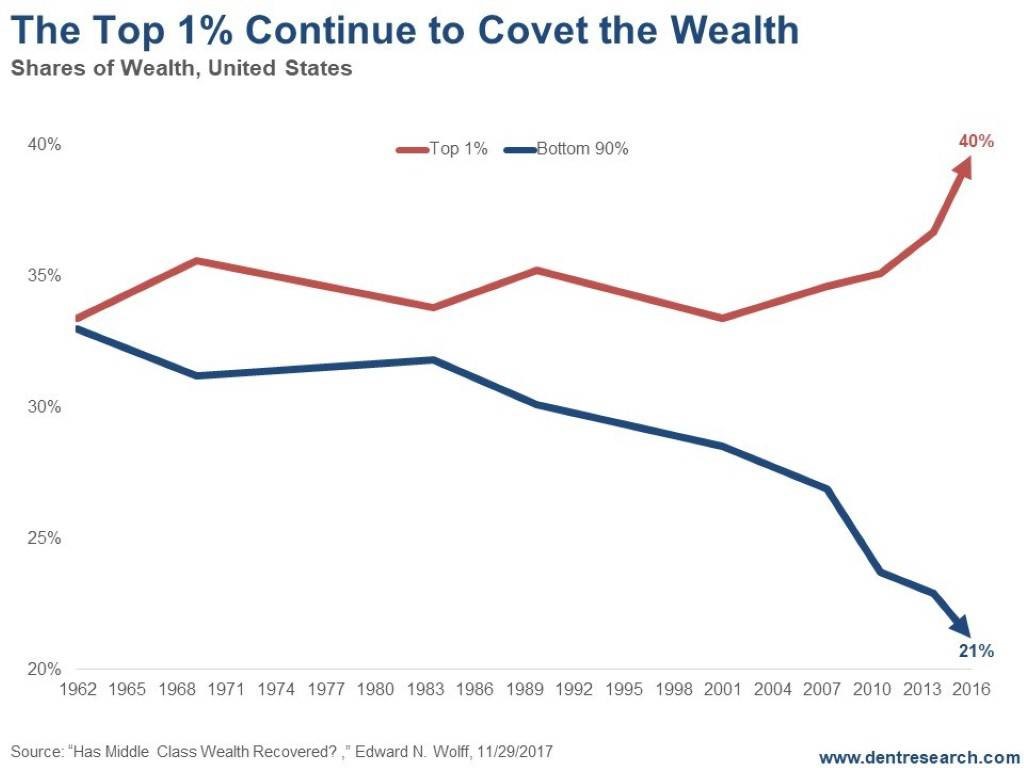I'm rereading
The Road to Serfdom. Accessibly written, Hayek lays out many of his most important ideas. According to Bruce Caldwell's introduction to the Definitive Edition, the book has sold 300,000 copies, which is rare for a book written for an academic audience. Hayek comments on income inequality, an issue that the Democrats and their media have adopted this year.
I do not understand this obsession because the greatest gains to the poor have occurred in countries whose laws are objective, that is, that follow the rule of law and that permit entrepreneurs to innovate. Such innovation results in increasing real wages, but it allows even greater gains to the entrepreneurs. The result is that in free market economies the poor become better off because of income inequality; the greater the entrepreneurial success, the greater the gains to the poor.
I wonder if the aim of the advocates of income redistribution is really to enhance state control, further reduce freedom, and improve the position of the inept rich, crony capitalists, at the expense of the poor. College professors do well when the inept rich do well because crony capitalism typically benefits universities. Show me a proposal for regulation, and I will show you a Rockefeller, Ochs-Sulzberger, Bundy, or Bush angling for the fruits of government violence. I will also show you a clique of academics cheering on the redistributive policy and the inadvertent gains to the inept rich in the interest of additional government subsidies to universities.
In order to effect wealth equality, government must violently compel its victims to give up their wealth to benefit the state's beneficiaries. Government violence results in declining national wealth, as failed socialist economies such as North Korea's, France's, India's, and the United States' show. As Winston Churchill put it, "The inherent vice of capitalism is the unequal sharing of blessings; the inherent virtue of socialism is the equal sharing of miseries." Of course, the effect of government violence is never really equality. Government cronies inevitably do well as the families of Kim Il-sung, George W. Bush, Barack Obama, and John D. Rockefeller illustrate.
Capitalism benefits the poor the most. Life expectancy in early modern Britain was between 25 and 40 years old, and in revolutionary America it was about 35. The gains in life expectancy came about because of improvements in sanitation and public health, and secondarily because of the invention of drugs. Market capitalism made both possible. For example, the wealth needed to construct sanitary housing did not exist in the precapitalist economy. The capitalist increases in the real hourly wage that continued in the US until the expansion of government spending in the 1960s, when the US transitioned from a capitalist to a socialist state, meant that the poor working person could improve his lot through saving. Today, many working Americans cannot save because of the high costs of home ownership, commodities, and taxation, all due to government and Federal Reserve policy.
In
The Road to Serfdom Hayek discusses how, in the absence of public resistance, socialism leads to totalitarianism. The requirements of central planning, economic regulation, and wealth redistribution directly contradict the requirements of the rule of law and democracy. Wealth redistribution is inherently coercive. The advocacy of income equality is the advocacy of violence.
With respect to government programs to enforce wealth equality, Hayek draws parallels to Nazis (p. 117):
A necessary and only apparently paradoxical result...is that formal equality before the law is in conflict with, and in fact incompatible with, any activity of the government deliberately aiming at material or substantive equality of different people, and that any policy aiming directly at a substantive ideal of distribution justice must lead to the destruction of the Rule of Law. To produce the same result for different people, it is necessary to treat them differently. To give different people the same objective opportunities is not to give them the same subjective chance. It cannot be denied that the Rule of Law produces economic inequality--all that can be claimed for it is that this inequality is not designed to affect particular people in a particular way. It is very significant and characteristic that socialists (and Nazis) have always protested against "merely" formal justice, that they have always objected to a law which had no views on how well off particular people ought to be, and that they have always demanded a "socialization of the law," attacked the independence of judges, and at the same time given their support to all such movements as the
Freirechtsschule which undermined the Rule of Law.
Hayek, who came from Austria, adds this footnote:
It is therefore not altogether false, when the legal theorist of National Socialism, Carl Schmitt, opposes to the liberal
Rechstaat (i.e., the Rule of Law), the National Socialist ideal of the
gerechte Staat) ("the just state")--only that the sort of justice which is opposed to formal justice necessarily implies discrimination between persons. [Editor Bruce Caldwell adds the following: German jurist Carl Schmitt (1888-1985) was a critic of liberal parliamentarianism and defender of the authoritarian state. In the 1930s he attempted to reconcile his views with those of the Nazis, offering legal justifications of their takeover of the government and defending the Nuremberg Laws that excluded Jews from public and social life. Though he lost favor with the Nazis by 1936, outside of Germany he was often viewed as the legal theorist of National Socialism. Hayek also refers to the
Freirechtsschule, which is the German term for "legal realism," a doctrine that holds that instinct rather than rule-following is the actual basis of judicial interpretation of the law."--Ed.]


